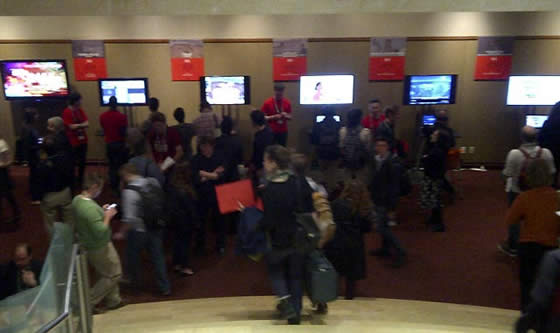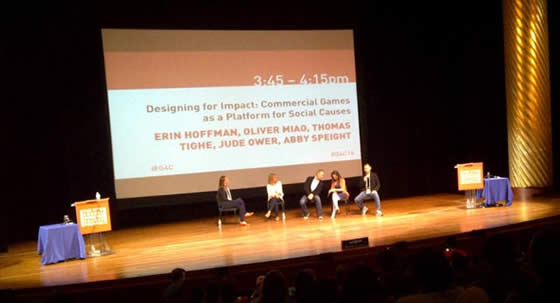 Working primarily in documentary film production, I decided it is time to explore New Media, Transmedia, Cross Media and Serious Games to inquire if and how these relate to documentary filmmaking and what the future holds in store for all of them.
Working primarily in documentary film production, I decided it is time to explore New Media, Transmedia, Cross Media and Serious Games to inquire if and how these relate to documentary filmmaking and what the future holds in store for all of them.
And so I attended the opening day of the Games for Change Festival 2014. Now in its eleventh edition, Games for Change Festival partnered this year with the Tribeca Film Festival. This new partnership allows the Tribeca festival to explore new and alternative forms of storytelling.
Jane Rosenthal, co-founder of the Tribeca Film Festival supported this wholeheartedly when she opened the Games for Change Festival stating that Film Festival have to change and evolve so they will not become an endangered species. Plus, she added that the gaming industry and the film world have a lot to learn from each other.
To kick off the festival, keynote speaker Jane McGoniagal, Director of Games Research and Development at the California based non profit Institute of the Future, presented a glimpse into the next decade by projecting potential award winning game ideas. McGoniagal based her ideas on current trends in science and technology, that she called “signals of transformation”. Combining a variety of trends into new narratives, she presented five game ideas and asked the audience to vote for their favorite. Amongst the five contenders were a Gambling for Change Game, a Low Carbon Impact Diet Game, an Empathy Building Game, a Crowd Participation Game to promote physical health, and the winner: Socrates 2.0 – a game that transforms higher education and no longer requires a college degree.
My take-away from this presentation was to become more attentive to “signals of transformation” – and to try and note what upcoming trends may be. 
Next up was Google’s Chief Gamer Designer Noah Falstein. He compared game designers to chefs or recipe writers, and, like Jane, confirmed that the current state of games is healthy. The number of people owning powerful digital devices around the world continues to grow – and games are increasingly analyzed and applied in more and more scientific areas, including neuroscience and psychology.
The presenters of GLASSLAB – an organization that works with educators and game designers to design serious games with an impact in the classroom, disclosed that highschool children these days spend on average 13 hours a week playing video games, and only 4 hours a week doing their homework. What a potential for serious game designers to create games that can contribute to a child’s learning experience!
Later in the day, Pontus Westerberg, Digital Projects Officer of the UN Habitat Project presented the BLOCK BY BLOCK partnership. Collaborating with Mojang, the production company of the popular Minecraft game, the UN Habitat’s mission is to involve communities around the world to design and improve their public spaces. The Minecraft game was re-purposed and used by local communities – young and old – to visualize their ideas for public spaces, thus making them active participants in the redesigning of their cities. This unique partnership between UN-Habitat and Mojang runs for four-years and aims to upgrade 300 public spaces by 2016.
 And finally, the day’s closing panel discussion, Games for Change introduced a new fund-raising model that partners commercial game developers with NGOs and non-profit organizations to raise funds for a good cause. One example that stood out is “High School Story” – a game where players support a victim of bullying and help her to become more self assertive. Pixelberry Studio’s CEO Oliver Miao – a former victim of bullying himself – and his team developed the game in collaboration with award-winning cyberbullying charity The Cybersmile Foundation, and donated some of the proceeds of the game to the Cybersmile Foundation.
And finally, the day’s closing panel discussion, Games for Change introduced a new fund-raising model that partners commercial game developers with NGOs and non-profit organizations to raise funds for a good cause. One example that stood out is “High School Story” – a game where players support a victim of bullying and help her to become more self assertive. Pixelberry Studio’s CEO Oliver Miao – a former victim of bullying himself – and his team developed the game in collaboration with award-winning cyberbullying charity The Cybersmile Foundation, and donated some of the proceeds of the game to the Cybersmile Foundation.
From this one day of key notes, presentations, discussions and lectures, it is easy to see how games can make a difference. They may not yet change the world, but they certainly can contribute to improving our lives. I am curious whether more connections between documentary films and serious games will develop over the next years. Especially as both forms of storytelling share a common mission: to engage the audience, expose them to new ideas and ideally motivate them to take action. I can also imagine that games can make more use of short documentary films to further engage the player, or provide more background information to a particular subject matter within a game. And in return, documentary films may benefit in reaching a wider audience if they can create a game that explores the content of their film in an interactive, engaging and entertaining way.
Furthermore, it will be interesting to see whether educational institutions will fully embrace serious games as a teaching tool – and if so, what impact this will have on children and students.
I look forward to checking in with the festival again next year.
If you want to check out more from the Games for Change Festival, join the live stream
http://new.livestream.com/g4c/day1

